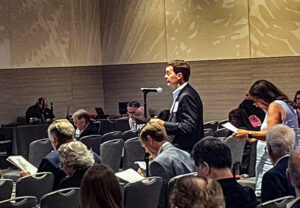
Colin Edgerton, MD, testifies in reference committee.
The HOD voted to send the resolution to the Council on Medical Service to work with the ACR and other groups to further explore challenges surrounding biosimilar implementation and payment and to identify recommended solutions to the problem, to be reported at the interim HOD meeting in November.
On this issue, the ACR is currently co-leading with the Coalition of State Rheumatology Organizations (CSRO) the Underwater Biosimilars Coalition, of which the ASGE is a member. The Coalition began in summer 2024 after members approached the ACR with concerns about reimbursement for infusing certain biosimilars—infliximab and rituximab—being much lower than the costs for procuring them. This discrepancy is primarily due to the rebates negotiated between PBMs and drug manufacturers, which the manufacturers must report to the CMS. The CMS then includes the rebates in the ASP methodology for setting reimbursement rates to providers for infusing these biosimilars. The Coalition thus far has met with the CMS, MedPAC and the Office of Management & Budget and is currently engaging Congress through a comprehensive letter-writing campaign.
With Resolution 103, the ACR and ASGE hope to ensure that patients have unimpeded access to biosimilars and that providers are reimbursed adequately for their infusion. We also hope to broaden this advocacy by appealing to the AMA and additional specialty societies that may have a stake in ensuring providers are no longer negatively impacted by suboptimal reimbursement for infusing biosimilars.
CMS Payment Monitoring Following Government Staff Reductions; Access to Important & Essential Drugs
For many years, the ACR has closely engaged the Association for Clinical Oncology on an array of advocacy priorities. At this meeting, the ACR cosponsored two resolutions submitted by the association, both of which were adopted by the HOD.
Resolution 235, CMS Payment Monitoring Following Government Staff Reductions, called for the AMA to actively monitor the reductions in force implemented at the CMS and to provide a method whereby providers can report associated CMS payment delays to the AMA.
Resolution 522, Access to Important and Essential Drugs, called for comprehensive legislation to mitigate existing drug shortages and prevent future shortages of lifesaving and life-prolonging drugs.
Both issues highlight common priorities for our respective organizations and emphasize the ACR’s coalescence with other organizations when our respective priorities are aligned.
Physician-Performed Microscopy Procedure (PPMP) Designation for Synovial Fluid Crystal Exam
The HOD recommended for adoption Resolution 504, led by the Georgia Society of Rheumatology’s delegation and cosponsored by the ACR. This called for the modification of the Clinical Laboratory Improvement Amendments (CLIA) of 1988 to categorize synovial fluid crystal analysis as a provider-performed microscopy procedure (PPMP), to be performed by appropriately trained physicians.

